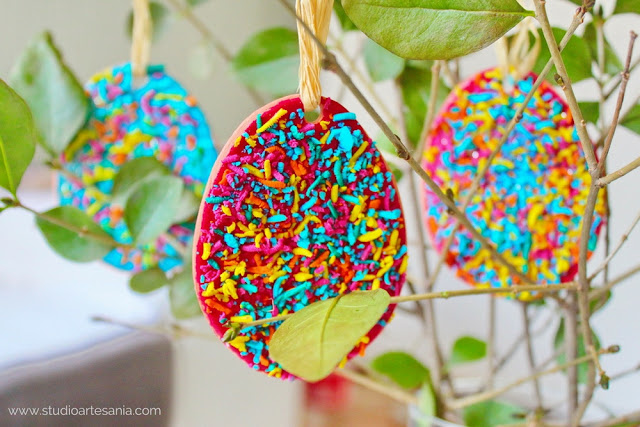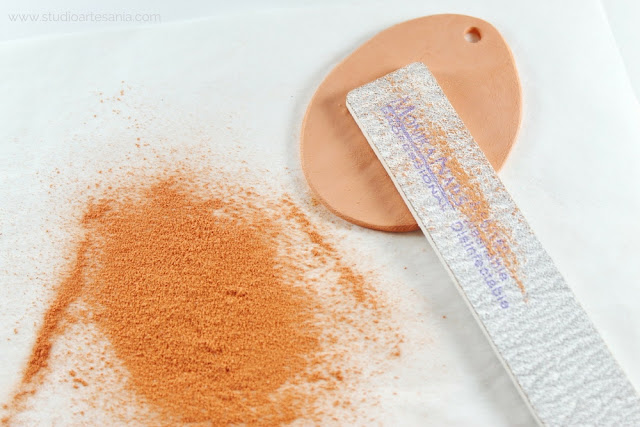DIY Cookies-looking Easter eggs table decoration
Material and tools
Air
dry clay (terracotta or white)
Polymer
clay (green, turquoise blue, magenta,
yellow, orange)
Egg
template
Baking
paper
Paper
towels
Acrylic
roller
A small
bowl of water
Straw
Mini grater
Aluminum foil
Aluminum foil
Bristle
paintbrush
Nail
file or sandpaper
Protective mask
Tacky or wood glue
Acrylic
paints (green, turquoise blue, magenta,
yellow, orange)
Glitter
Raffia
or paper ribbons
Step 1.
I've
already explained how to make templates in various sizes and shapes in the separated
tutorial, so use that instruction as a reference to make an egg template. My template is 9 cm (3.54 inches) high and 7 cm (2.75
inches) wide, so if you want to have exactly
the same size of eggs before you start
drawing your template measure and mark on bend side of paper 9 cm (3.54 inches).
Then in the middle of the earlier mark,
which is on 4,5 cm (1.77 inches), mark the width which is 3,5 cm (1.37 inches).
Connect the points with a curved line, and
cut your template with the scissors.
For
the base of the eggs, you will use air
dry clay. You can use terracotta or white air dry clay. But, if you want to
archive the look of the cookie then terracotta is a
better choice. In case you use white clay, you can leave it as it is or paint the
eggs after drying (and before the glazing and decorating) with beige or brown acrylic paint. I made several eggs with terracotta and few with white clay. The white ones are a gift for my friend.
I
already have explained how to work with air dry clay in my tutorial for the Striped heart, so to
avoid repetition what I already wrote, please
use it as a reference for preparing the clay, cutting the base, holes making
and surface treatment and drying. You will need to
follow the steps from 2 to 14, with the differences
that this time you will shape the clay as an egg
and make only one hole in it.
Step 2.
While
you waiting for air clay to dry start
preparing the polymer clay. Cut the one bar of yellow polymer clay from the
package and knead it with your hands to become slightly soften. Then make a rod.
Wrap the yellow rod in aluminum foil. Soften, make rods and wrap all the other
colors of the polymer clay.
Place the rods wrapped in foil in the freezer for approximately half an hour to firm them up so you can easier grate them latter. Do not worry, clay will not change its properties due to freezing. You can use leftovers from another polymer clay projects if you have them.
Place the rods wrapped in foil in the freezer for approximately half an hour to firm them up so you can easier grate them latter. Do not worry, clay will not change its properties due to freezing. You can use leftovers from another polymer clay projects if you have them.
Step 3.
Turn
your oven to heat up to recommended
temperature for baking the polymer clay you use. The recommendation is in every package, but as a reference you will bake Fimo in 110 ° C (230 ° F),
Premo on 130 ° C (266 ° F) and Kato on 150 ° C (302 ° F). While you heating up the
oven, place the sheet of baking paper on the working surface, take out one of the polymer clay rods from the freezer
and by using the mini grater grate it into tiny shreds.
You must be quick because the clay will begin to
soften from the warmth of your hand. If you notice that the clay is to soft and
sticky freeze it again.
The mini grater I use is kitchen tool for
grating spices,
chocolate or smaller blocks of cheese, but I use this one
only for polymer clay. I have another one with a diferently colored handle for food prepping and it has its place in my kitchen until this
one is placed with my other polymer clay tools.
Spread the clay shreds with a light touch of your fingers evenly over the baking paper and place it on
the baking tray. Put the tray in the freezer or in the fridge to keep clay shreds firm. Grate all the other clay rods in
the same manner. After you grate the last rod, put the tray with all the clay
colors into the oven and bake for 15 minutes. In every other case, you will bake clay for 30 minutes because
you do not want your polymer clay to be underbaked.
But, for this project insufficiently baked clay is necessary.
Step 4.
While the clay is baking prepare 5 bowls
or plastic containers so you can keep the clay separated later. After 15
minutes of baking remove the tray from the oven. Carefully so you do not get
burn on tray take out one of baking
papers with the clay. Bend the paper and shake the clay into the bowl. Some of
the clay chunks can stick together so rub
them between your fingers to split them. Clay is slightly warm, but you can't get
burned on it. Repeat with other colors. Let
the clay to cool completely for about 10 to 15 minutes. Then again rub the clay
chunks between your fingers to crush them even more. Since the clay is underbaked it will break easily.
Take one more bowl or container and put
in it a tablespoon of every clay color. Shake the bowl lightly to mix the clay
particles. Set all the bowls with clay chunks aside.
Step 5.
For
sanding, you can use sandpaper, but in my
experience, the semi-rough nail file works
the best for air dry clay. To round the edges of the back of egg you will place
the nail file vertically at the 45-degree
angle and pull it once or twice in the same place. To
level out irregularities on the egg place the file horizontally on the edge at 90-degree angle and pull it one or two times
until you get smooth and even shape. Tap the egg several
times on the table, and then wipe it with paper towels to remove dust
from your creation.
If
you notice cracks on back of some of the eggs, do not worry because you will repair that later when you decorate them. Since
the front of eggs are nicer and we want to have professional
looking pieces you will use it as back part of the piece.
Step 6.
In
the small bowl or on plate mix a little tacky glue with a bit of acrylic paint
in the desired color. You want to get a mixture
of thick consistency. For mixing use the bristle
brush. For one egg same dimensions as mine,
you will need about one teaspoon of glue.
Instead of tacky glue, you can use wood glue since both become transparent after drying, so all you'll see after drying is the color of the paint. Some of the glues, such were the one I used, can be more liquid and you will have to put in it a bit more of paint to thicken it up. If you have thicker glue don't dilute it with the water. Depending on how much paint you have put into tacky glue your glaze can be fully colored or slightly transparent after drying. Basically, the glue is added to the mixture so you can attach the polymer clay pieces to the air dry clay.
Instead of tacky glue, you can use wood glue since both become transparent after drying, so all you'll see after drying is the color of the paint. Some of the glues, such were the one I used, can be more liquid and you will have to put in it a bit more of paint to thicken it up. If you have thicker glue don't dilute it with the water. Depending on how much paint you have put into tacky glue your glaze can be fully colored or slightly transparent after drying. Basically, the glue is added to the mixture so you can attach the polymer clay pieces to the air dry clay.
Step 7.
During
the decorating of eggs, which is a bit of messy process, protect your work
surface with newspaper or piece of baking
paper. The paper that you have put beneath
will also help you latter to gather clay pieces and return them to the bowl.
With
the circular movement of the brush apply
glaze on the back of the egg. Carefully bring the glaze as close to the edges
as you can. In case that glaze exceeds the edge carefully wipe the edge with paper towels. During
the glazing, you may notice unevenness on the glazed
surface but that will not be noticeable
later on because the mixture of paint and glue will level up and you will cover
it with polymer clay shreds. Also, it's not a mistake
if you apply a thicker layer of glaze,
but it's important that it's not thinner
than one millimeter (0.03 inches).
Glaze just one or maximum two eggs at once because the paint in the mixture will dry soon and if that happened you will not be able to add polymer clay pieces.
Glaze just one or maximum two eggs at once because the paint in the mixture will dry soon and if that happened you will not be able to add polymer clay pieces.
Step 8.
Sprinkle
the glaze with the polymer clay shreds.
You can apply only one color of polymer clay or a mixture of all of them, it's your choice.
You can, also, apply just a few polymer clay chunks or cover the entire surface with them.
Step 9.
To
add a bit of shine on the eggs sprinkle them lightly with fine glitter. I used
gold one, but you can use glitter in whatever color you like. Just keep in mind
that you do not want to overdo it with the glitter.
After
you have added the decoration carefully lift and turn the egg, tap it lightly
with the finger on the back to shake out the excess of
the polymer clay shreds and glitter.
Turn the egg on the decorated side again, and with the
tip of your finger gently push the polymer clay pieces that protrude out of the
edges of the shape. Leave aside, and
glaze and decorate other eggs. After you finish decorating let the eggs to dry
overnight. Since the glue is made on a water base, it mildly moistens
the air dry clay, so it takes about 12 hours to everything be completely dry.
Step 10.
For
the hanging part, I used natural raffia,
but you can use paper or other types of ribbons in whatever color you want.
Tread the ribbon through the hole, and
tie both ends in the knot. And that's it! Your decorative Easter eggs are ready
to grab everyone's attention.
If
you like this tutorial share it on your favorite social network by clicking the
buttons down below.






















0 comments